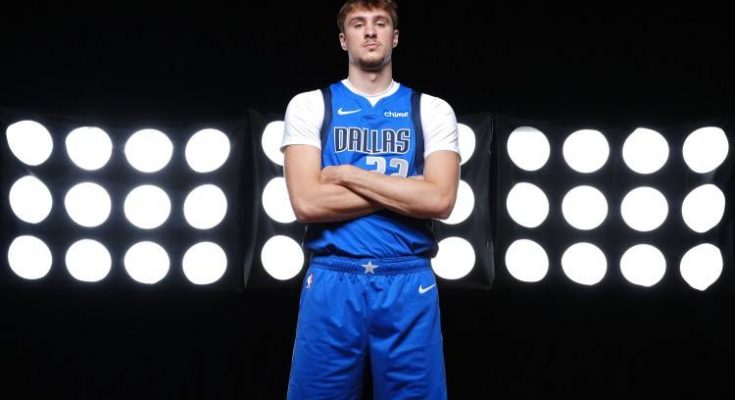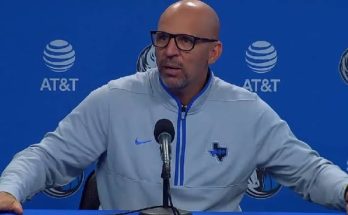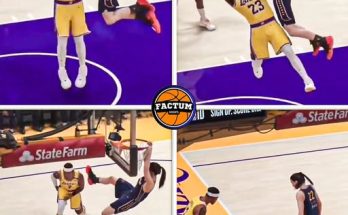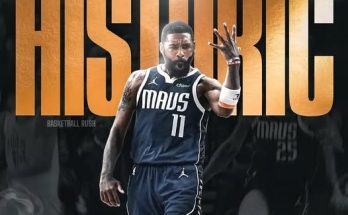When the ratings for NBA 2K26 began to circulate, most fans expected the usual storylines to dominate the conversation: superstars like Nikola Jokić, Giannis Antetokounmpo, Jayson Tatum, Luka Dončić, and LeBron James anchoring the high-90s club, rookies sitting in the low-to-mid 70s, and the occasional underrated veteran complaining about his score on social media. What no one saw coming, however, was a rookie forward making history before he ever played a professional game. Cooper Flagg, the top pick in the 2025 NBA Draft and one of the most hyped prospects of the last decade, shocked the basketball world when his NBA 2K26 rookie rating was revealed — a lofty 84 overall. To put that in perspective, his starting mark not only places him among the highest-rated rookies in 2K history, but also above the initial ratings of Zion Williamson, Anthony Edwards, and Karl-Anthony Towns when they entered the league. It’s a development that has sparked debate, fueled excitement, and raised serious questions about whether the video game’s developers are making a bold prediction or setting up a rookie for impossible expectations.
Flagg’s rating is historic for several reasons. NBA 2K typically reserves its mid-80s ratings for young players with proven NBA experience or second-year players showing star-level development. Most rookies, even those selected first overall, land somewhere between 77 and 81. For example, Zion Williamson, one of the most hyped draft prospects since LeBron James, entered the league with an 81 overall rating in NBA 2K20. Karl-Anthony Towns, who went on to win Rookie of the Year, began with an 80 overall in 2K16. Anthony Edwards, now an All-Star and centerpiece of the Timberwolves, started his career in 2K21 with a 77 overall. Yet Flagg, before stepping foot on an NBA court, is graded three to seven points higher than all of them. For those who follow the way 2K distributes its numbers, that difference is enormous. Every point between 80 and 85 represents a significant leap in expected production and recognition of NBA-level skill. In effect, the game’s developers are saying Flagg is not just a great rookie, but someone already projected to perform like a budding All-Star.
What makes the rating so surprising is the cautious precedent NBA 2K has historically taken with rookies. The developers, led by Ronnie Singh (known as Ronnie 2K), have always maintained that the ratings are built not just on potential, but on evidence. A rookie has no NBA tape, no proven track record against the world’s best players, and no demonstration of how his college or high school dominance will translate to the professional stage. For this reason, rookies rarely breach the low 80s. Flagg’s 84, then, represents an exception to the unwritten rule. It suggests that the hype surrounding him has transcended the cautious approach, placing him in a rare category alongside players like LeBron James, whose rookie rating in NBA 2K4 was an unprecedented 78 but quickly vaulted into the 80s after just a few updates, and Victor Wembanyama, who last year entered NBA 2K25 with an 84 overall rating, the highest rookie rating since the series began.
Comparisons to Wembanyama are inevitable, and they provide the clearest context for why Flagg’s number is so high. Wemby’s unprecedented skillset as a 7’4” shot-blocker with guard-like handles and a three-point stroke earned him a generational label, and 2K reflected that in its daring rating. In Flagg’s case, the combination of elite defensive instincts, polished offensive tools, high basketball IQ, and relentless motor has drawn scouts to call him one of the most NBA-ready prospects in history. At Montverde Academy and later in college, Flagg showed a maturity and dominance that suggested he could step onto an NBA floor and contribute immediately. He defends multiple positions, shoots comfortably from deep, creates for teammates, and rebounds like a veteran big. He is not a one-dimensional player; rather, he embodies the modern “do-it-all forward” archetype that NBA franchises covet. That completeness may have influenced 2K’s developers to make a bold projection, essentially saying that his floor as a rookie is already higher than what most lottery picks bring to the table.
The shock value of Flagg’s rating doesn’t just come from its number, but from who it surpasses. Zion Williamson’s 81 as a rookie was considered generous, given that most rookies enter below 80. Zion was the most dominant college player in recent memory, a 6’7”, 285-pound powerhouse with highlight-reel dunks and freakish athleticism. Yet 2K still held him at 81, citing durability questions and the difficulty of projecting his game to the NBA. Anthony Edwards, who has since blossomed into a superstar and face of Team USA basketball, started with a 77, largely because his shooting percentages in college were shaky and scouts questioned his efficiency. Karl-Anthony Towns, the number one pick in 2015, started at 80 despite being widely praised for his offensive versatility as a big man. For Flagg to eclipse all three of these players is not just about the rating itself, but a statement that 2K believes his skillset is more immediately translatable than theirs.
Fans and analysts are divided on the decision. Some view the 84 overall as an exciting validation of Flagg’s hype. It signals that the basketball world, from scouts to gamers, recognizes him as a prospect who could change the trajectory of a franchise from day one. Others see it as reckless, a dangerous precedent that places unrealistic expectations on a teenager who has yet to play against NBA competition. Every rookie faces growing pains, and even the most polished prospects struggle in their first season adjusting to the speed, physicality, and skill of the league. By starting Flagg at 84, 2K risks painting a picture where anything less than stardom is seen as failure. If he averages 12 points and 6 rebounds, numbers that would be strong for most rookies, fans may perceive it as underwhelming relative to his virtual counterpart.
Still, the move fits into a broader trend where 2K leans into storylines and hype to generate buzz. Ratings debates fuel social media engagement, and no topic fires up players, fans, and athletes like the numbers next to their names. By giving Flagg an 84, the developers have ensured that conversations about the game’s realism, accuracy, and fairness will dominate headlines for weeks. It also makes sense from a marketing standpoint: Flagg’s rating guarantees that casual fans will experiment with him in the game, eager to see if the hype translates in virtual form. In MyTeam and MyCareer modes, Flagg is instantly a sought-after player, one who can anchor lineups and appeal to fans of youth and potential.
Another element to consider is the evolution of how basketball prospects are evaluated. In the past, rookies were judged mostly on their physical tools and college production. Now, with advanced scouting, film analysis, and international competition, evaluators have a more comprehensive sense of how skills translate. Flagg, for example, showcased his ability against top-tier talent in FIBA competitions and high-level prep matchups. He didn’t just dominate against weaker opponents; he thrived against peers who are themselves NBA-caliber players. That body of work may have convinced 2K’s developers that he is less of a gamble than previous rookies.
Of course, ratings are not destiny. Plenty of players have started with modest 2K numbers and gone on to stardom, while others with high ratings failed to live up to the promise. Michael Carter-Williams, for example, won Rookie of the Year and saw his 2K rating skyrocket temporarily, but never sustained that success. On the flip side, Giannis Antetokounmpo began his career as a relatively unknown project with a low rating, only to develop into a two-time MVP and NBA champion. For Flagg, the 84 overall rating is more of a statement about perception than production. It shows how scouts, developers, and the basketball world at large view his talent ceiling and NBA readiness. Whether he lives up to it is a story yet to be written.
One overlooked aspect is how Flagg himself will respond. Young players often take pride in their 2K ratings, seeing them as a form of validation. For some, a lower number becomes motivation to prove doubters wrong. For Flagg, the challenge may be the opposite: living up to a number that already places him above some All-Star players in their rookie years. He has always embraced pressure, showing poise in high-stakes games and never shying away from expectations. If anyone is equipped to carry the burden of an 84 rating, it may be him. But it also adds another layer to the microscope already on his career. Every performance will be dissected, every struggle magnified, and every highlight amplified.
In the grand scheme, the debate about Flagg’s rating highlights the intersection of sports, gaming, and culture. NBA 2K is not just a video game; it’s a cultural barometer that influences how fans perceive players. A high rating can boost a rookie’s popularity, marketability, and fan support. For Flagg, the 84 overall is not just a number, but a launchpad for his brand, signaling that he is already among the NBA’s most intriguing figures. Whether fair or not, it adds fuel to his narrative as one of the most anticipated debuts in modern basketball history.
Ultimately, Cooper Flagg’s shocking NBA 2K26 rating is less about the exact number and more about what it represents. It reflects a rare confidence in a player’s immediate ability to impact the NBA, placing him in the conversation with some of the most generational prospects of all time. It challenges the conventional wisdom that rookies must prove themselves before earning respect, instead projecting greatness from day one. Whether he matches, exceeds, or falls short of that virtual version, the buzz ensures that every fan will be watching closely. For 2K, that’s mission accomplished. For Flagg, it’s both a blessing and a challenge: a sign that the world already views him as special, and a reminder that the real test begins not on a screen, but on the hardwood.



